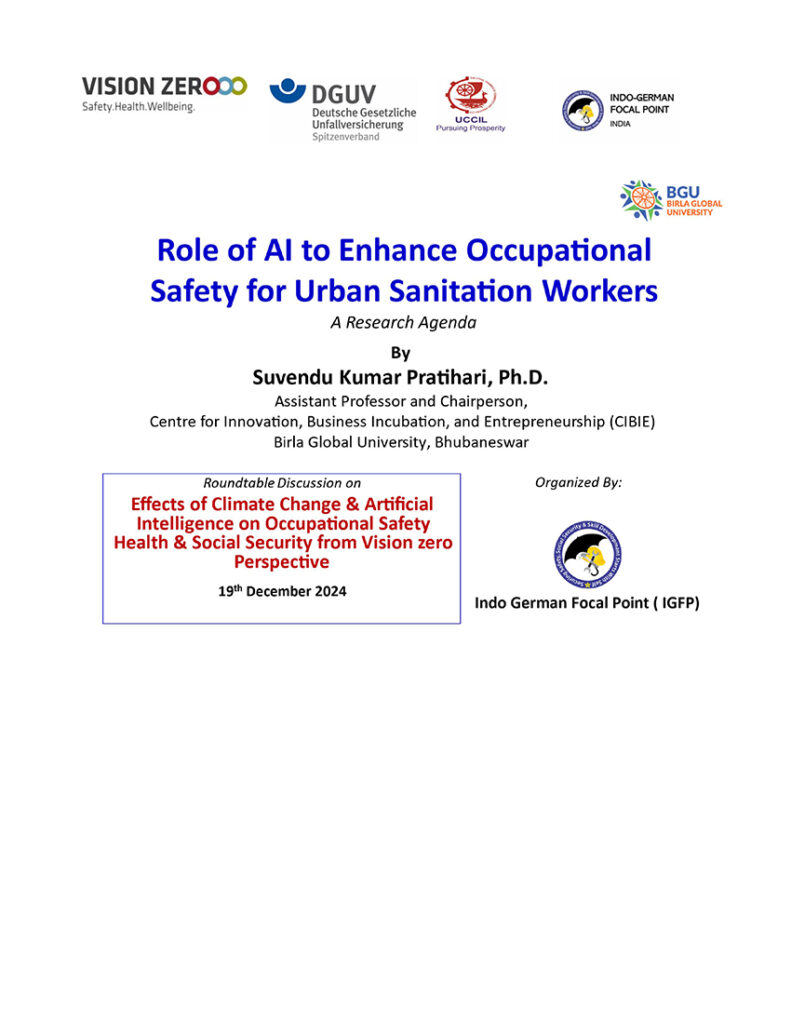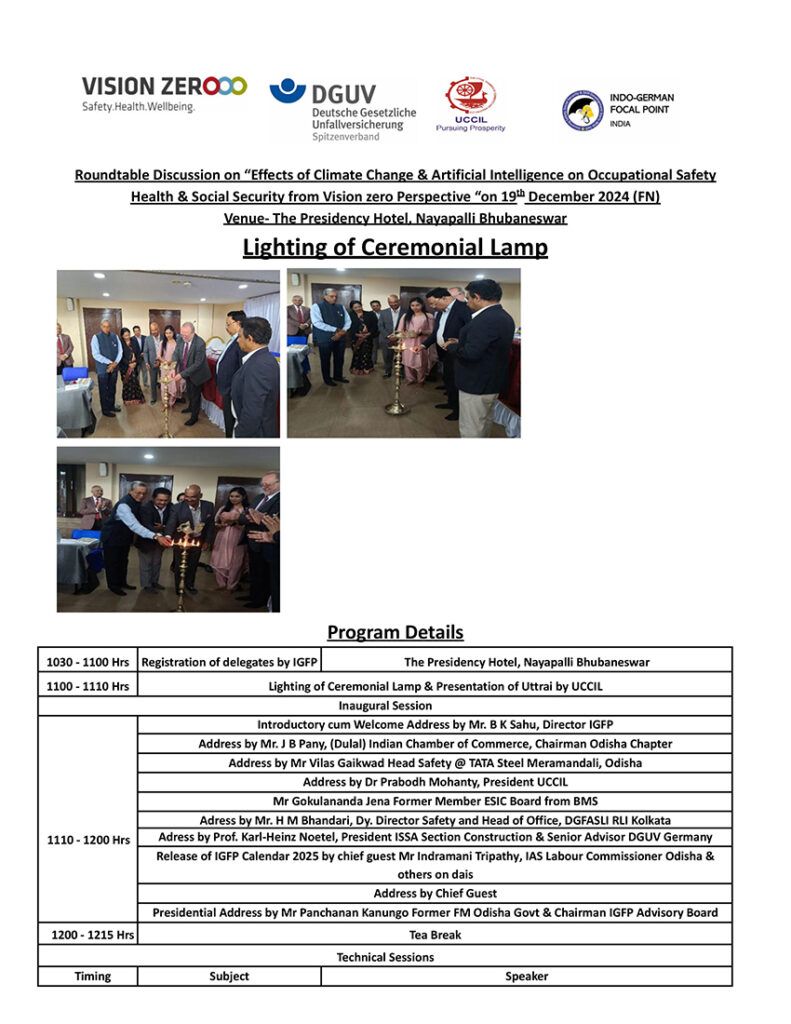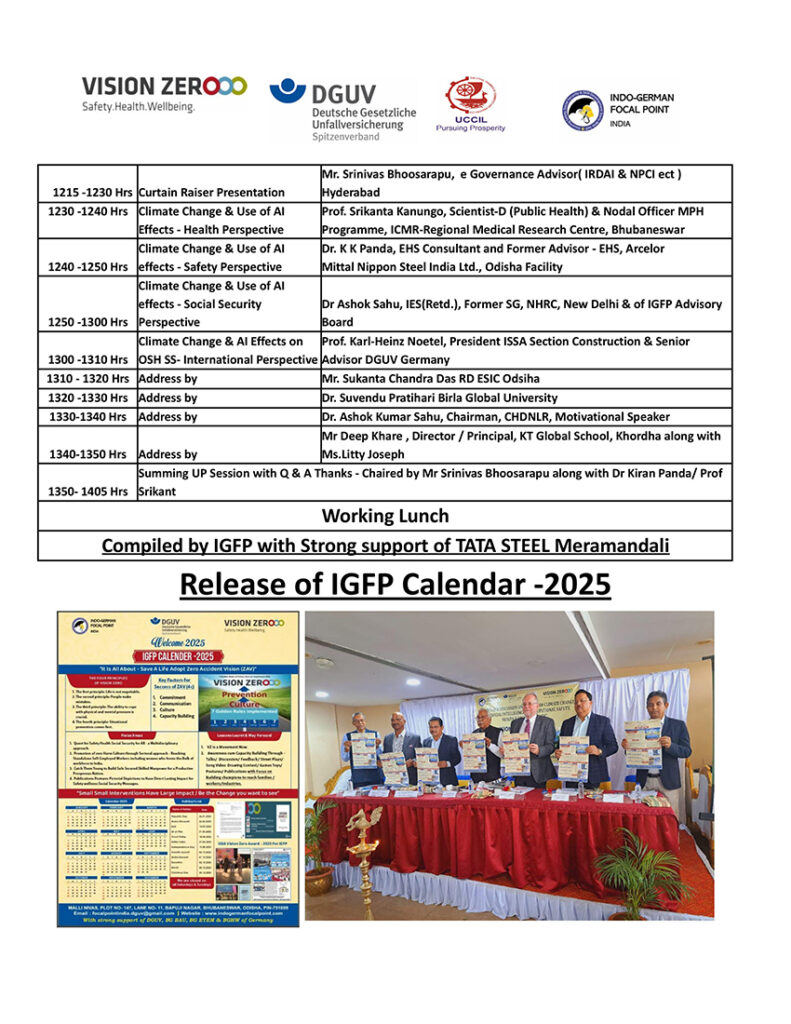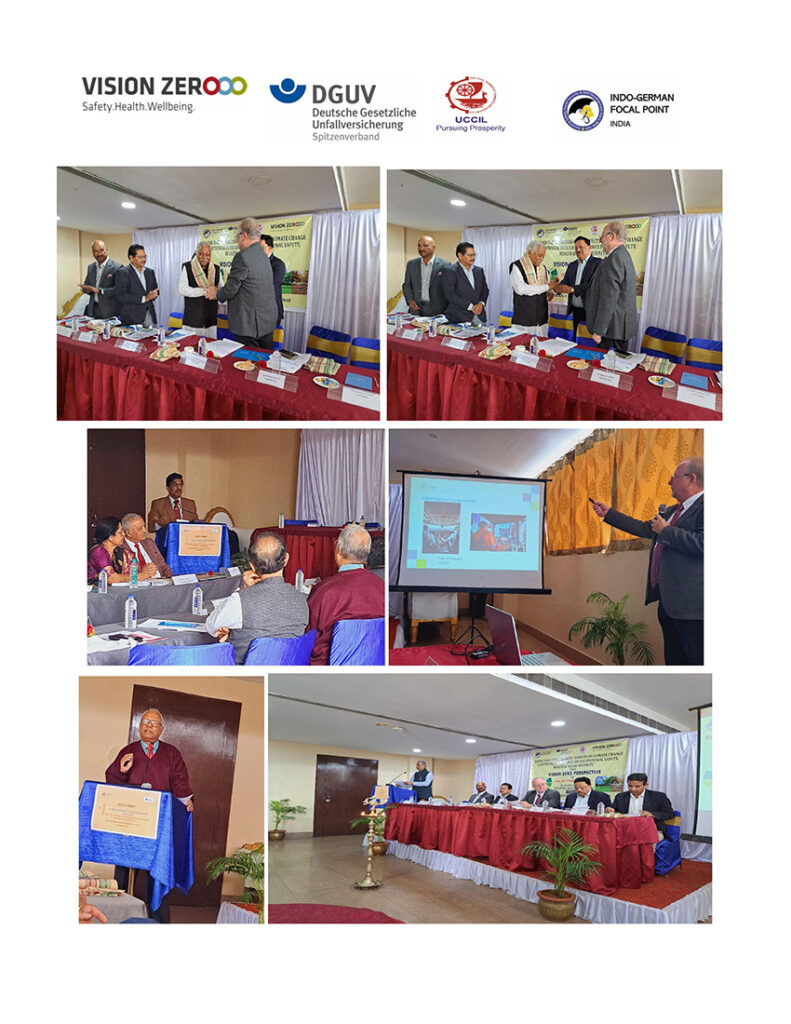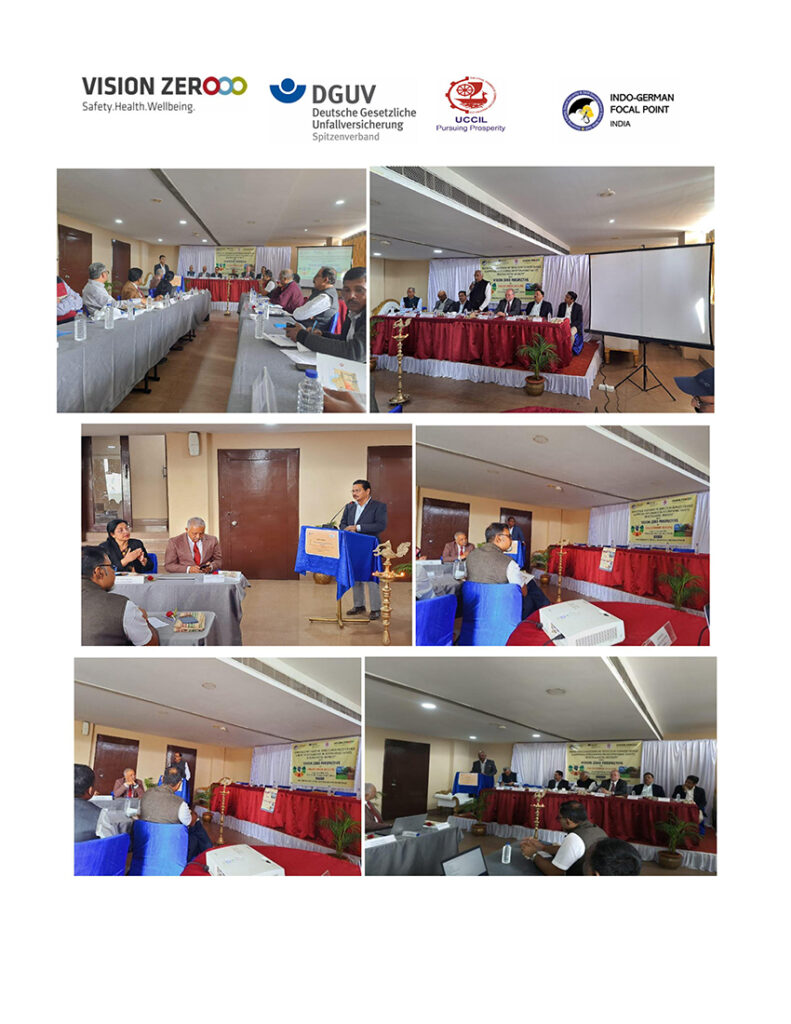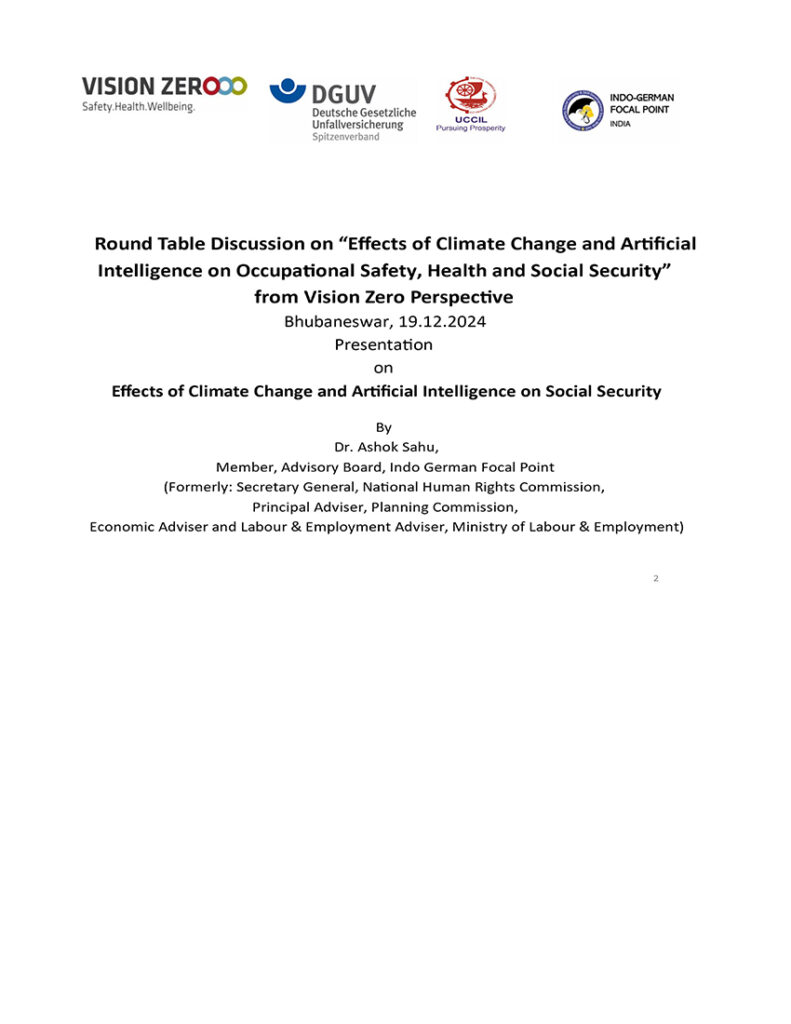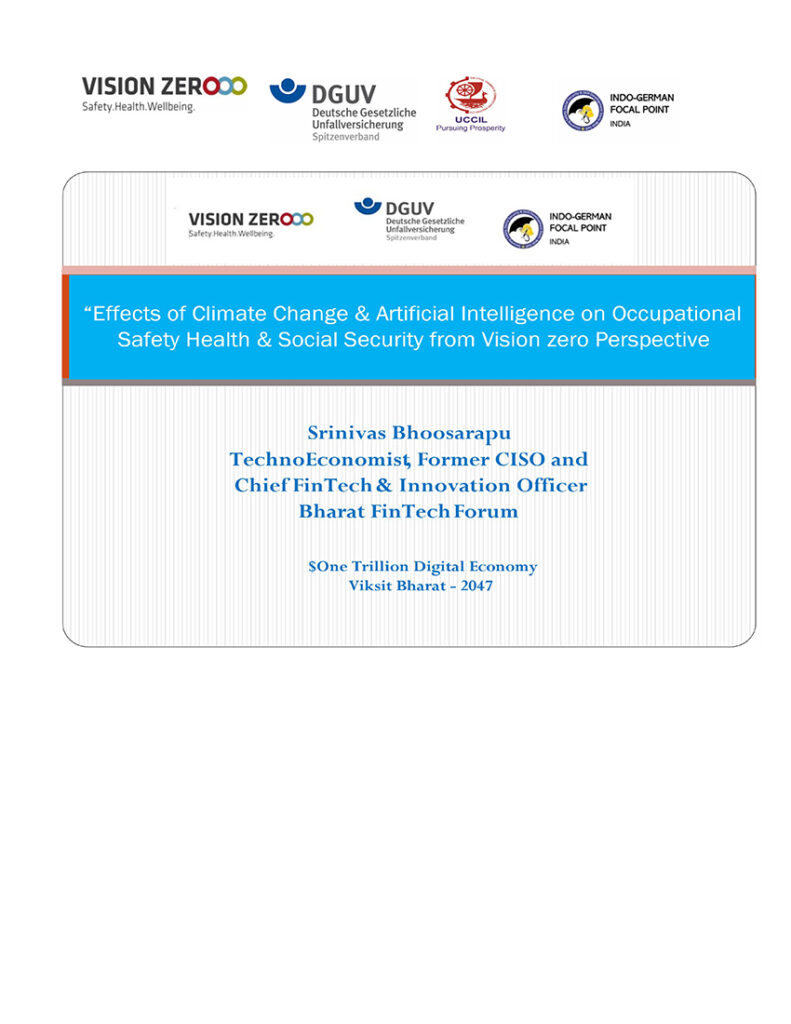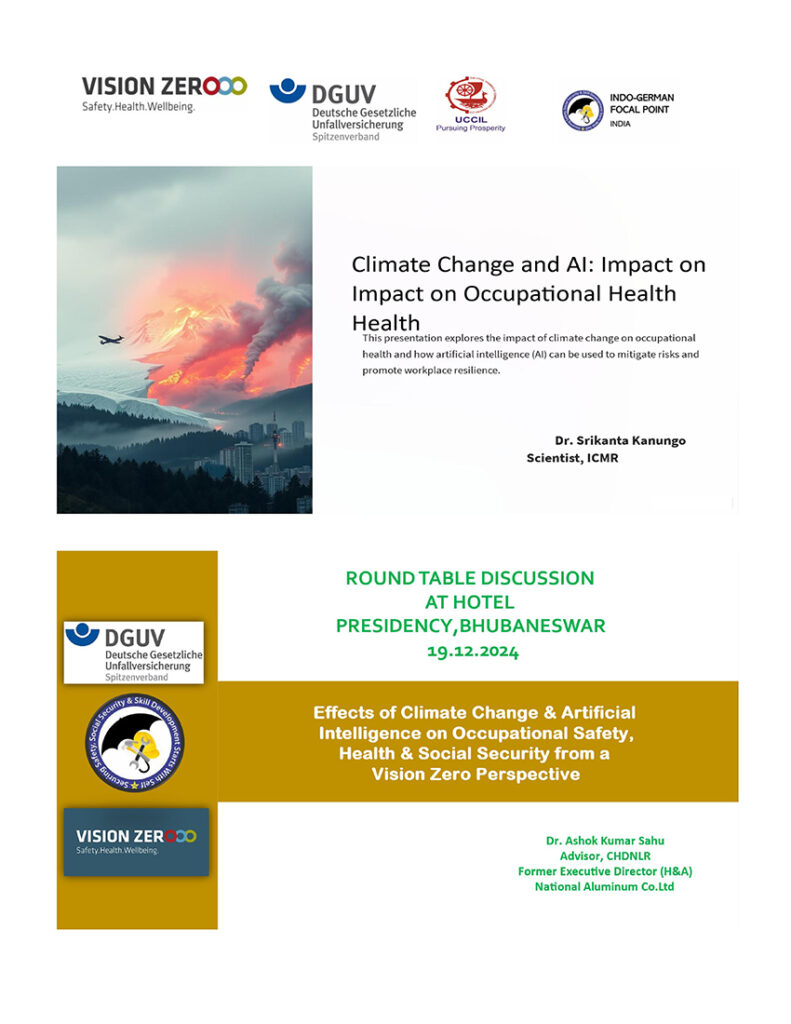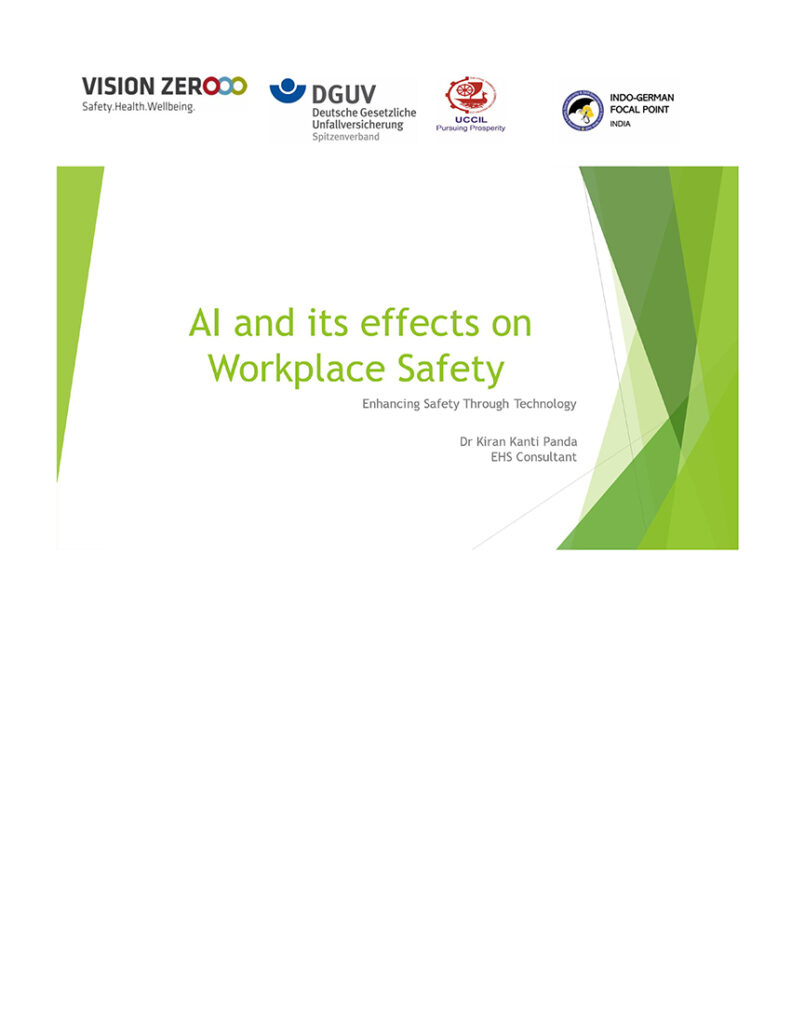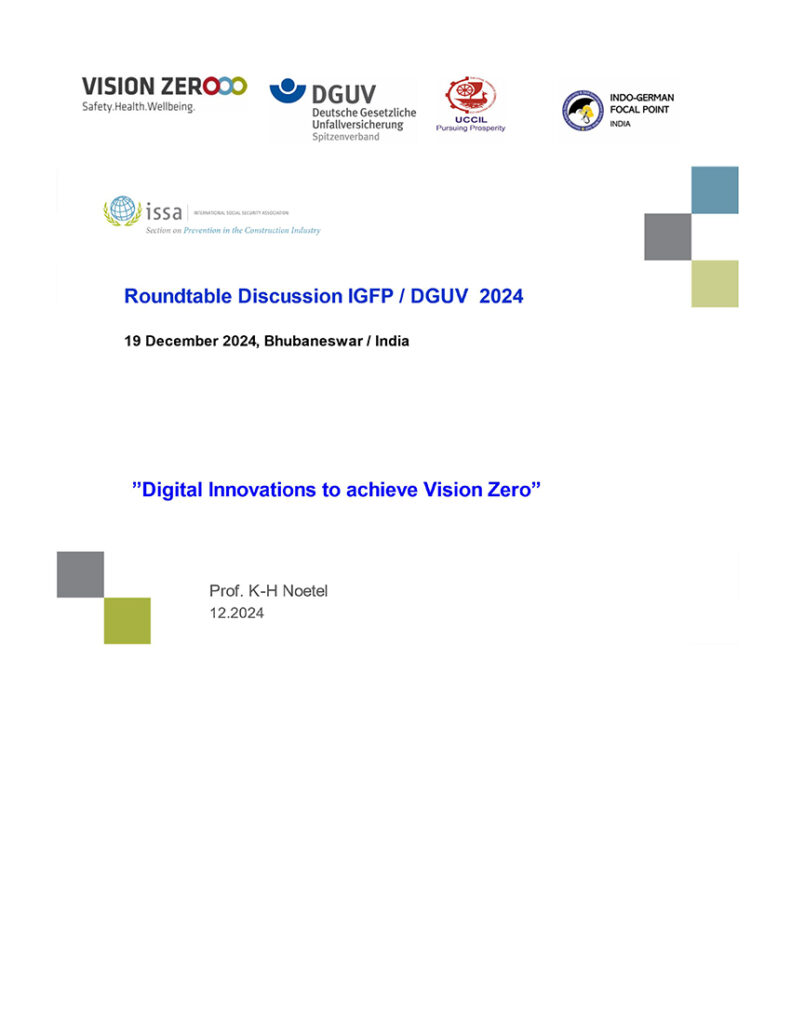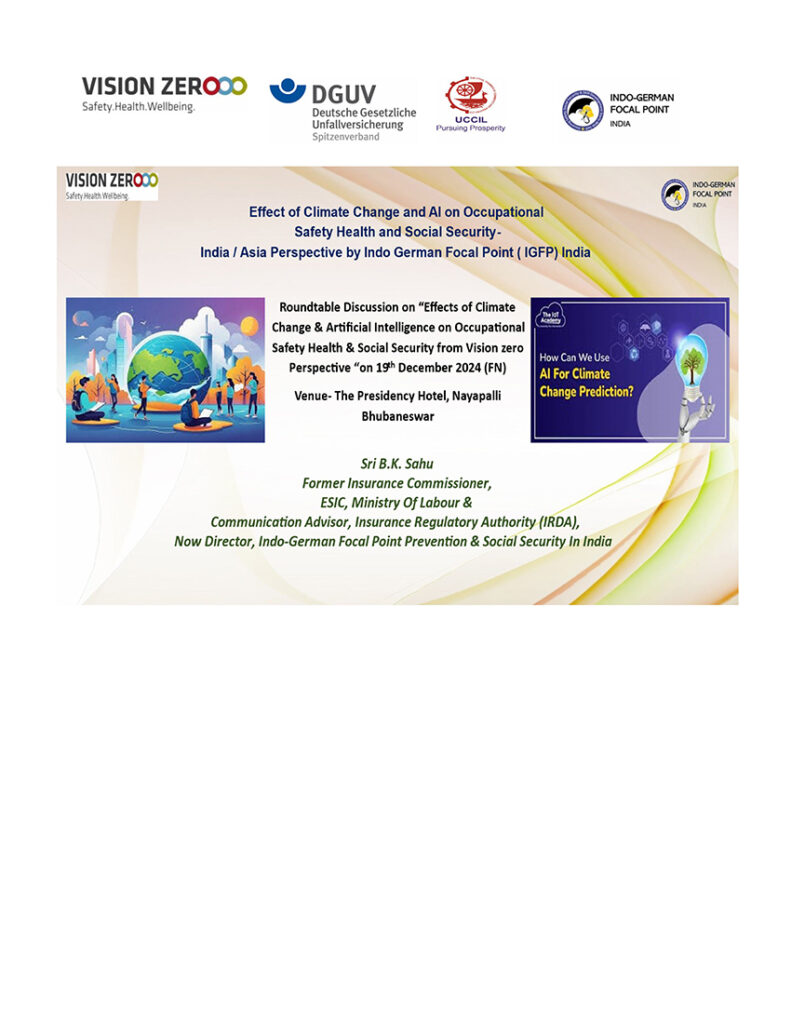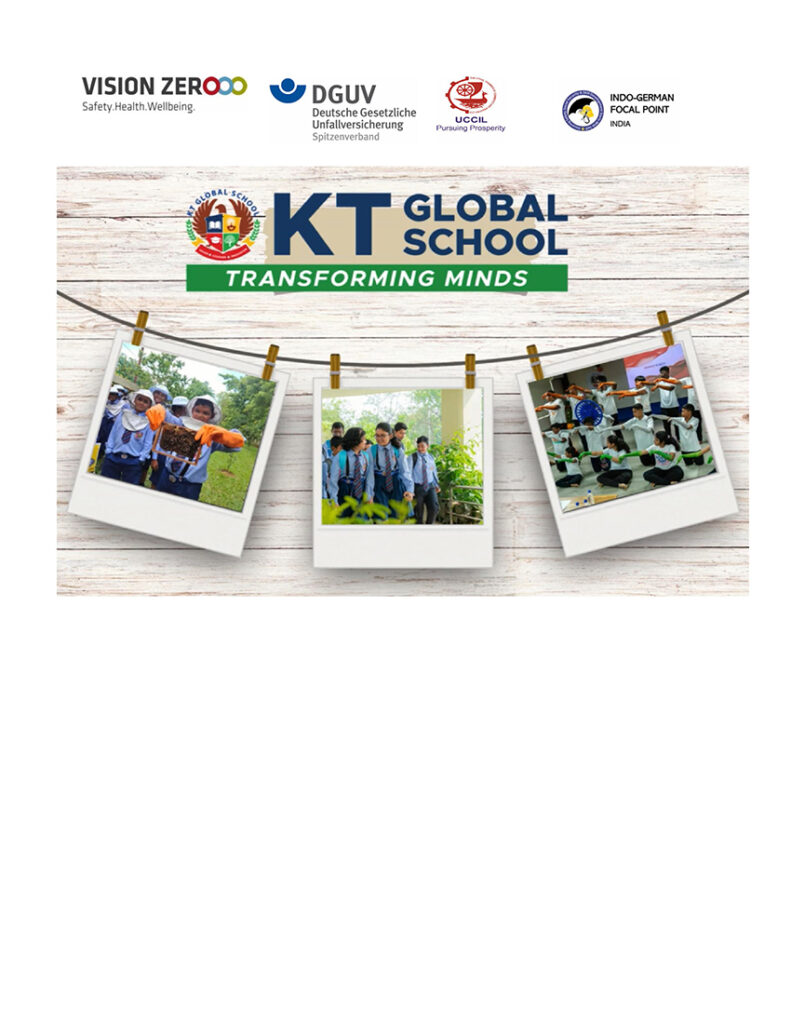Home / Roundtable Discussion on “Effects of Climate Change & Artificial Intelligence on Occupational Safety Health & Social Security from Vision zero Perspective “on 19th December-2024 (FN) – Venue- The Presidency Hotel, Nayapalli Bhubaneswar
Roundtable Discussion on “Effects of Climate Change & Artificial Intelligence on Occupational Safety Health & Social Security from Vision zero Perspective “on 19th December-2024 (FN) – Venue- The Presidency Hotel, Nayapalli Bhubaneswar

Respected Guests/ Learned Speakers/ Participants,
It was a great moment for Indo German Focal Point ( IGFP) to Coordinate the Roundtable Discussion on Climate Change and Use of AI Effect on Occupational Safety Health and Social Security on 19th December 2024@ Bhubaneswar – A Multidisciplinary Approach in Getting Safety Health and Social Security together/ How these 3 are being Affected by Climate Change & AI Use / What the Way Out to Facilitate A Safe Workplace with Secured Workforce taking these effects.
Another Unique Feature of This RT Discussion is Bringing together All Stakeholders under 1 Floor- Government of India ( ESIC) Government of State ( Addl LC Odisha ) International Expert( DGUV Germany) Industrial Chambers ( ICC Odisha/ UCCIL) industries ( TATA STEEL) Safety Social Security Motivational Activists & From University/ College/ School/ IT Expert/ Medical Expert ( ICMR).
The Presentations by All Stakeholders & Discussion could bring very Useful Takeaways which will be submitted to Regulators/ Chambers/ Industries/ TUs/ International Agencies to tune Present Acts/ Rules/ Regulations involving OSH SS to take required Steps in Climate Change & AI Perspective.
A Liner of Importance – All Guests/ Speakers brought out the Challenges confronting Safety Health & Social Security by Climate Change Affecting Workers/ industries But AI Could be used Selectively to Take Care of Hazards without Giving Room for Displacement / Difficulty for Informal/Unorganized Workers who form the bulk in india’s Context.-Use of AI for Awareness / Behavioural changes including through talks & importance of safety & wellness also on off work involving workers.
I take this opportunity to thank All our Esteemed Guests Led by Mr Panchanan Kanungo Former FM Odisha Govt/ Prof Karl Heinz Noetel / Learned Speakers/ Valued Supporters/Participants as Per Program Enclosed.
IGFP Calendar 2025 with Focus on Vision Zero was released on the occasion ( Enclosed)
Title Slides of All Presentations along with Few Photos Enclosed
While Closely Wishing All A Happy Christmas & Prosperous 2025
Impact-25 Individuals 15 Institutions (TBC)With Cheers & Regards
Mr B.K Sahu
(And the Journey Continues …)
ISSA Vision Zero Award 2023 to IGFP @ World Congress Sydney
Roundtable Discussion on “Effects of Climate Change & Artificial Intelligence on Occupational Safety Health & Social Security from Vision zero Perspective “on 19th December 2024 (FN)
Introduction
The adoption of Zero Accident Vision (ZAV) with a focus on climate change and the use of AI can significantly enhance Occupational Safety and Health (OSH) and Social Security (SS) systems.
ZAV aims to eliminate workplace accidents and injuries, and integrating AI can help achieve this goal by providing real-time monitoring, predictive analytics, and automated safety protocols. AI-driven technologies can predict potential hazards, optimize safety measures, and ensure compliance with safety standards, thereby reducing the risk of accidents and improving overall workplace safety.
Objective:
Zero Accident Vision (ZAV) focuses on eliminating workplace accidents and injuries, and integrating AI can significantly enhance OSH.
Digital Transformation:
Digital transformation is the process of using technology to change a business’s processes, culture, and customer experience to meet market and business needs. It can involve:
- Digitizing operations: Automating internal processes to reduce manual work and increase productivity
- Business model transformation: Changing how an organization delivers products and services to customers
- Using new technologies: Incorporating software, cloud computing, artificial intelligence (AI), data analytics, and the Internet of Things (IoT)
AI can support social security systems by identifying and addressing the needs of workers affected by climate change. For instance, AI can help in the early detection of climate-related health issues, ensuring timely medical intervention and support. It can also assist in the efficient distribution of social benefits, making the system more resilient and responsive to the challenges posed by climate change. By combining ZAV with AI, we can create safer work environments and more robust social security systems that are better equipped to handle the impacts of climate change.
Climate change is having a profound impact on global health. Rising temperatures, increased frequency of extreme weather events, and shifting patterns of disease vectors are leading to a surge in heat-related illnesses, respiratory issues, and vector-borne diseases such as malaria and dengue. These changes strain healthcare systems and disproportionately affect vulnerable populations, including the elderly, children, and those with preexisting health conditions. Additionally, the displacement of communities due to climate-related disasters can lead to mental health challenges and disrupt access to essential health services, exacerbating health inequalities.
Digital Transformation of the work with Emerging Technologies such as AI/ML, IIoT (Industry 4.0), Robotics, 3D Printing, Additive Manufacturing.
Artificial Intelligence (AI) is playing a significant role in addressing climate change by enhancing our ability to understand, predict, and mitigate its impacts.
Artificial Intelligence (AI) offers innovative solutions to mitigate these health impacts. AI-powered predictive models can forecast disease outbreaks and extreme weather events, enabling timely public health interventions. AI can also enhance the efficiency of healthcare delivery through remote monitoring and personalized treatment plans, especially in regions with limited medical resources. Furthermore, AI-driven environmental monitoring systems can track air and water quality, helping to prevent exposure to harmful pollutants. By integrating AI into health strategies, we can build more resilient healthcare systems capable of adapting to the challenges posed by climate change.
AI-driven predictive models can forecast extreme weather conditions and potential hazards, enabling timely interventions and safety measures. Real-time monitoring systems powered by AI can track environmental conditions and worker health, ensuring immediate response to any unsafe situations. Also AI can optimize safety protocols and training programs, making them more effective and personalized to individual workers’ needs. By integrating AI into occupational safety strategies, workplaces can become safer and more resilient in the face of climate change.
AI-driven predictive models can help anticipate climate-related risks and inform policy decisions, ensuring that social security systems are better prepared to respond to crises. AI can also enhance the efficiency of social service delivery by automating administrative tasks and providing personalized support to individuals. By integrating AI into social security strategies, governments can create more resilient systems capable of supporting communities in the face of climate change.
AI is also being used to monitor and reduce deforestation, track greenhouse gas emissions, and support sustainable agriculture. Organizations like the United Nations are leveraging AI to develop strategies for climate change adaptation and mitigation, such as the MyAnga app, which helps Kenyan pastoralists manage drought conditions by providing real-time data on weather patterns. By harnessing the power of AI, countries can work together more effectively to combat climate change and achieve the Sustainable Development Goals (SDGs), making the planet greener, cleaner, and fairer. Heat , Drought, UV Radiation, Decorbonation , Circular Economy.
Conclusion:
The integration of Digital Transformation, AI, Zero Accident Vision (ZAV), Occupational Safety and Health (OSH), Social Security (SS), and Ayushman Bharat represents a comprehensive approach to enhancing public health and workplace safety in India.
Digital Transformation and AI are revolutionizing healthcare through initiatives like the Ayushman Bharat Digital Mission (ABDM), which aims to create a robust digital health infrastructure. This mission facilitates seamless access to health records, improves healthcare delivery, and ensures data privacy and security1. By leveraging AI, the ABDM can predict health trends, optimize resource allocation, and provide personalized care, making healthcare more accessible and efficient.
Zero Accident Vision (ZAV) focuses on eliminating workplace accidents and injuries, and integrating AI can significantly enhance OSH. AI-driven predictive analytics can identify potential hazards, automate safety protocols, and monitor real-time conditions to prevent accidents2. This approach not only improves worker safety but also reduces the economic burden on social security systems by minimizing workplace injuries and associated costs.
By combining these elements, India can create a safer, healthier, and more resilient society, better equipped to handle the challenges of climate change and other emerging threats.
Participants:
- Trade Union Representative
- Safety Health Social Security activist & International speakers
- Prof. Noetel
- ISSA Vision Zero (Geneva)
- Dr. Fuellemann Switzerland
- RD ESIC
- RPFC
Reference:
- https://www.dguv.de/en/prevention/arbeitenvierpunktnull/technologien/index.jsp
- https://academic.oup.com/joh/article/66/1/uiad017/7505756
- https://www.weforum.org/stories/2024/02/ai-combat-climate-change/
- https://news.un.org/en/story/2023/11/1143187
Event Schedule
19th December 2024 from 11AM to 2 PM
- Inauguration of the Program – DG ESIC, DGFASLI / Directorate of Factories Odisha / ICMR Bhubaneswar
- Curtain Raiser-Presentation on AI and it’s applications in Climate Change, OSH SS (SB & Prof. Noetel-TBC)
- Presentation on Health / Safety / Social Security (Safety Activist / Industry / ICMR / ESIC EPFO / State Construction Board & ISSA) with focus on present policy & reflecting way forward.
- Round Table Discussion.
- Conclusion with Q & A Session.
- Vote of Thanks
Working Lunch
Compiled by
Srinivas Bhoosarapu from Hyderabad
